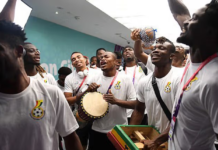It is always the last straw which breaks the camel’s back, and for those who have formed prejudicial misconceptions on the supposed promiscuity of Krobo women, Sarkodie’s latest lyrics “Krɔbɔ ni baa papa a ahweneɛ da ne sisi. Ɔkɔmfo Anɔkye de adwaman no abɔ ne dua”, literally translating as:“A good Krobo lady with beads around her waist. Okomfo Anokye has cursed her with promiscuity” is the last straw which broke the patience not only of Krobo women, but the Krobo youth as a whole.
The Kloma Hengme group, representing the interests of Krobo youth have been incensed to go for the jugular, because of all numerous attachments made to other ethnic groups- Ewes, Fantes and ‘Northerners’ (Superstition and Black magic), Gas (the love of merrymaking) , Asantes (love of buildings and businesses), just to mention a few, the tag of being unable to close the thighs, coupled with the perception that Krobo women constantly find themselves under the bellies of different men is the most demeaning, insensitive and unwarranted assertion anyone can refer directly or indirectly.
For years, the perception has festered in the Ghanaian psyche about a certain curse placed on Krobo women by the famous Asante fetish priest Okomfo Anokye, rendering generations of Krobo women promiscuous.
For a long time, Krobos, particularly, Krobo women, have had to laugh it off, perhaps in the spirit of good citizenship, completed by the belief that other ethnic groups (as stated above) have been tagged with similar misconceptions which are only but myths to bring some form of ‘variety’ into our Ghanaian society. However, it is not laughable anymore when this myth of promiscuity, as ugly and annoying as it is to the mindset of any passionate Krobo, moves from the realms of private tease into the annals of music- a very influential feature with equally influential dimensions in the society, including directing our thoughts and actions in everyday life.
Asantes may perhaps laugh it off when they are termed lovers of cement, Gas may shrug their shoulders when they are labeled merrymakers, Nzemas, Ewes and our folks up North may even be proud of the tag of lovers of black magic lovers and superstition (after all these form major features of the African Traditional Religion) , but Krobos will speak out in defense of their beautiful, intelligent and smart women, if and only if they are relegated to the perception of promiscuity, not in private conversations, but in music where mere perceptions are informed destructively into strong disbeliefs about the worth of Krobo women, even for institutions like marriage. This is the difference between our national friendly tease of our ethnic groups and the dangerous path taken by musicians such as Sarkodie whose lyrics goes long way to fuel passions, inform ways in which people think and direct the way rational agents behave.
So, for Sarkodie’s information, Krobo women do not hold the mantle of promiscuity, and to hold on to the lyrics of his music as it is, is to contribute immensely to the concretization of the many perceptions about the promiscuous escapades of Krobo women and young ladies in our universities, workplaces and even marriage circles. Please, let us not confuse nor belittle facts here-this misconception about Krobo women is very real; most Ghanaians have already formed strong perceptions and to profess it in any form outside private conversation as has been done (un)intentionally by Sarkodie’s lyrics is a way of informing a culture of disrespect for Krobo women, more dangerously to the detriment of our unique young ladies who find themselves in committed relationships or are subjects of prospective young men who see the unique qualities our young Krobo ladies exhibit. Yes!! This debate goes to that extent, if it is not out of way for the Ghanaian society to place the institution of marriage on such a high pedestal, even more to the extent of finding fault with some of our young women who remain unmarried by a certain age.
Moving forward, I strongly disagree with calls for compensation from Sarkodie via litigation or any alternative means available within the confines of civility.
Rather, Sarkodie could apply what he does best, his music for a two-pronged solution which promises to benefit his accusers, himself and help rectify the misinformed perception of the society as a whole.
He could compose a collaborative music rejoinder to the song ‘Jennifer Lomotey’. In this music rejoinder, he could involve some Krobo youth from the Kloma Hengme youth group, and collaboratively discuss ways of sharing the proceeds from the song.
Riding on the popularity of such collaboration, a result will also be a strong contribution to the deconstruction of the promiscuous perception of Krobo women, which by his actions has confirmed latent perceptions otherwise discussed in the private Ghanaian society.


![Ghana discover WAFU Zone B U17 Championship group [Full Group]](https://www.adomonline.com/wp-content/uploads/2024/04/WhatsApp-Image-2023-04-14-at-10.39.33-AM-218x150.jpeg)




